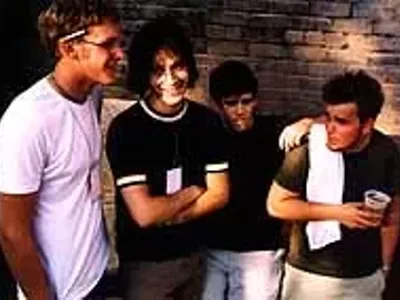
Audio By Carbonatix
[
{
"name": "GPT - Leaderboard - Inline - Content",
"component": "35519556",
"insertPoint": "5th",
"startingPoint": "3",
"requiredCountToDisplay": "3",
"maxInsertions": 100,
"adList": [
{
"adPreset": "LeaderboardInline"
}
]
}
]
Director Julien Temple’s new documentary on the Sex Pistols is meant to be a corrective to previous tellings of the punk rock founding myth, including his own ‘79 version, The Great Rock ‘n’ Roll Swindle, shifting the emphasis from the media manipulations of the group’s lunatic manager, Malcolm McLaren, and back to the visionary opportunism of the band’s lead singer, Johnny Rotten.
In this rendition, the Pistols were a fury summoned up by the needs of the day, a savage tonic to the bloated, declawed rock of the ‘70s, lean and hungry and bearing musical razors. They were also the new voice of an underclass of disenfranchised young people in an England grown complacent with its long-festering economic inequities. But while the musical impact of the band was immediately effective and long-lasting, the sociopolitical aspect quickly became obscured by the group’s notoriety as foul-mouthed louts and uncouth troublemakers who wouldn’t play the show-biz game – in short, as marketable danger.
At any rate, the idea that the Pistols were a force for social change seems now more a reflection of Rotten’s fantasy life than the actuality, at least according to the testimony of his bandmates – their interviews are all filmed here, like Rotten’s, in silhouette so that the sight of their ravaged, middle-aged faces won’t distract viewers from the "youthful exuberance" theme of the movie. They, like the group’s responsive audience, were less interested in making a societal critique than in responding to every generation’s need to discover a new way to party. And if it pissed off a perceived establishment, all the better.
Temple keeps things moving at a fair clip, using archival footage both fresh and familiar, and suggesting some aesthetic precursors for the band by mixing in clips of those eccentric and egregiously unfunny music hall comedians who were still plying their trade on British TV in the ‘50s and ‘60s. One can see these lowly buffoons as kindreds in anarchy, just as the clips of Laurence Olivier as Richard III suggest a source for Rotten’s pose as a gleefully wicked threat to the unnatural order.
All is exhilarating defiance until Sid Vicious joins the band, at which point the group’s protracted burnout begins. Rotten sees this as a conventional morality play – pure-at-heart artists destroyed by the callow maneuvering of the money men – but if ever a band was destined for early flameout it was the Pistols. But, in a sense, that was the whole point – play fast and die young – forging a cautionary tale for all the punk careerists yet to come.
Richard C. Walls writes about the arts for the Metro Times. E-mail him at letters@metrotimes.com.





